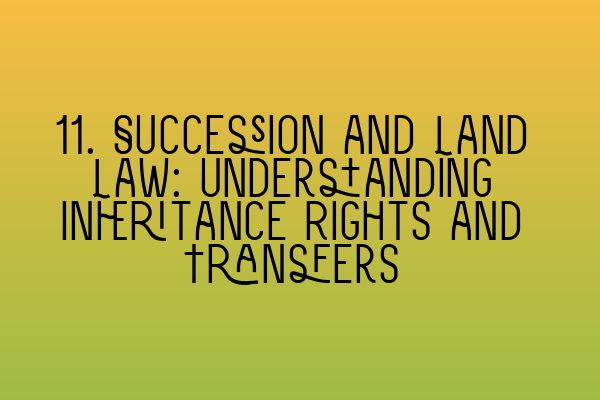Succession and Land Law: Understanding Inheritance Rights and Transfers
When it comes to property law, one of the most important aspects to consider is succession and inheritance rights. Understanding how the transfer of property occurs upon the death of an individual is crucial for both property owners and their potential beneficiaries. In this article, we will explore the key concepts of succession and land law, providing you with a comprehensive understanding of inheritance rights and transfers.
1. Intestate Succession
Intestate succession refers to the process of property distribution when an individual dies without leaving a valid will. In such cases, the property is transferred according to the rules set out in the SQE 2 Preparation Courses. These rules determine the order of succession based on the deceased’s relationship with potential beneficiaries. Understanding these rules is crucial to ensure that the property is distributed in accordance with the law.
2. Testamentary Succession
In contrast to intestate succession, testamentary succession occurs when an individual passes away leaving a valid will. The will serves as a legal document that specifies how the deceased’s property should be distributed. It is important to note that a will must meet certain legal requirements to be considered valid. If the will is deemed invalid, the estate may be distributed according to the rules of intestate succession.
3. Inheritance Tax
Another important aspect to consider when it comes to succession and land law is inheritance tax. Inheritance tax is a tax levied on the value of an individual’s estate upon their death. The amount of tax payable may vary depending on the value of the estate, any exemptions or reliefs that apply, and the relationship between the deceased and the beneficiaries. Understanding the implications of inheritance tax is crucial to ensure that the transfer of property is properly planned and can help minimize the tax burden on beneficiaries.
4. Transfer of Property
Once the succession process is determined, the transfer of property can take place. This involves transferring the legal ownership of the property from the deceased to the beneficiaries. The transfer can occur through various means, such as sale, gift, or inheritance. Understanding the legal requirements and procedures involved in transferring property is essential to ensure a smooth and legally valid transfer.
5. Beneficiaries’ Rights
Upon the transfer of property, beneficiaries acquire certain rights and responsibilities. These rights may include the right to occupy, use, and enjoy the property, as well as the right to sell or transfer their interest in the property. It is important for beneficiaries to understand their rights and obligations to ensure they can effectively manage the property and make informed decisions regarding its use and disposition.
6. Disputes and Resolutions
Unfortunately, disputes can arise in the context of succession and land law. These disputes may involve disagreements over the distribution of property, the validity of a will, or the interpretation of legal rights and obligations. In such cases, seeking legal advice and representation is crucial to resolve the dispute and protect your interests. Our SQE 1 Preparation Courses provide comprehensive training in dispute resolution and can help you navigate through any legal challenges that may arise.
Conclusion
Succession and land law play a fundamental role in determining how property is transferred upon the death of an individual. Understanding the concepts of intestate and testamentary succession, inheritance tax, the transfer of property, beneficiaries’ rights, and dispute resolution is essential to ensure a smooth and legally valid transfer of property. Whether you are a property owner or a potential beneficiary, having a firm grasp of these concepts can help you make informed decisions and protect your interests. Should you require further assistance or have any questions, do not hesitate to seek advice from our experienced property law solicitors at SQE Property Law & Land Law.
Related Articles:
